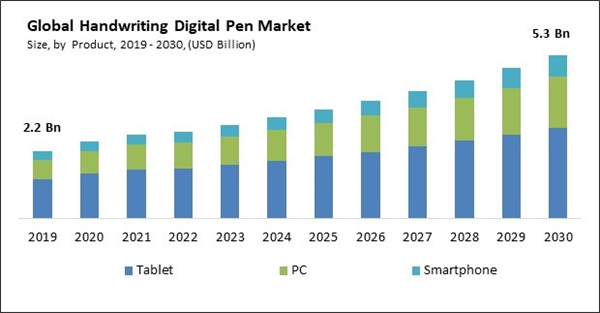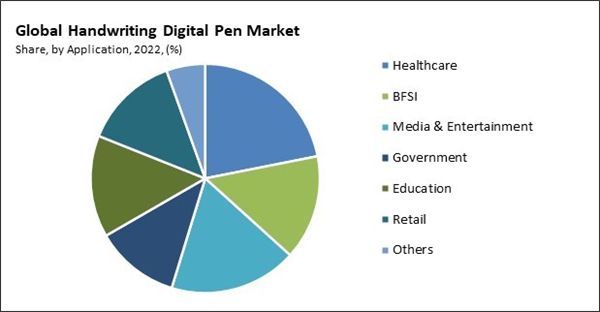The COVID-19 pandemic accelerated the shift to remote learning, prompting educational institutions to seek tools that facilitate efficient and interactive digital education. Therefore, the education segment will register share in the market by 2030. Handwriting digital pens have been instrumental in enabling students and educators to create, share, and interact with handwritten content in virtual classrooms. Handwriting digital pens offer a more interactive and engaging learning experience. Students can actively participate in discussions, solve problems, and share their handwritten work, mimicking a traditional classroom experience even in remote settings. These factors pose lucrative growth prospects for the education segment. Some of the factors impacting the market are Emergence and growing adoption of digital platforms across various sectors, seamless transition from traditional handwriting to digital content, and challenges related to compatibility with different devices and platforms.
As digital platforms become central to various industries, the need for collaboration tools that seamlessly integrate analog and digital work becomes more pronounced. Handwriting digital pens provide a way to bridge the gap between physical and digital content creation, allowing individuals to transfer handwritten notes, sketches, or annotations to these digital platforms. This integration meets the need for collaborative tools, fostering a more integrated workflow. These factors will drive the demand for handwriting digital pens in the coming years. Additionally, The ease of transitioning from traditional writing to digital content appeals to a wide user base. This user-friendly approach attracts individuals seeking a familiar, natural writing experience while leveraging the benefits of digital storage and sharing capabilities. The user-friendly nature of these pens fosters increased adoption among various demographics, from professionals to students and creative artists. The accessibility and ease of use of handwriting digital pens cater to a broader audience. Users can easily share, collaborate, and contribute handwritten input to digital platforms, fostering a more interactive and inclusive collaboration experience. Owing to these aspects, the market will grow rapidly.
However, Compatibility issues limit the ease with which users can seamlessly integrate handwriting digital pens with various devices or platforms. This hampers the overall user experience, making it cumbersome and less intuitive. As a result, potential users might opt for alternative solutions that offer a more straightforward integration, leading to reduced adoption of handwriting digital pens. If a pen works optimally only with specific devices or software, it excludes potential users who use alternative platforms. This limitation in accessibility decreases the potential user base. Constantly addressing compatibility issues can escalate support and maintenance costs for manufacturers. Therefore, these aspects can limit the expansion of the market in the coming years.
Application Outlook
On the basis of application, the market is divided into BFSI, healthcare, government, media & entertainment, education, retail, and others. The healthcare segment recorded the maximum revenue share in the market in 2022. Digital health records and paperless systems are becoming accepted in the healthcare sector. Handwriting digital pens play a significant role in this transition by allowing healthcare professionals to easily convert handwritten notes, patient charts, and medical records into digital formats. This transition has improved data accuracy, accessibility, and organization of patient information.Product Outlook
Based on product, the market is segmented into PC, tablet, and smartphone. In 2022, the smartphone segment garnered a significant revenue share in the market. Smartphones are no longer limited to communication; they serve as powerful productivity tools. Handwriting digital pens that are compatible with smartphones provide a natural and tactile way to interact with mobile devices, enhancing productivity by enabling handwritten note-taking, annotations, and sketches on the go. Integration with smartphones allows for the seamless digitization of handwritten notes and drawings.Regional Outlook
By region, the market is segmented into North America, Europe, Asia Pacific, and LAMEA. The North America segment procured the highest revenue share in the market in 2022. Numerous cutting-edge tech businesses instrumental in advancing handwriting digital pen technologies are based in North America. Continuous innovation, including improved accuracy, pressure sensitivity, and integration with smart devices, has contributed to the appeal and adoption of these pens in the region. Handwriting digital pens have gained popularity in educational institutions across North America. These devices cater to the needs of educators and students by offering an efficient means to digitize notes, enabling more interactive and engaging learning experiences. Thus, these aspects will boost the demand in the segment.The market research report covers the analysis of key stake holders of the market. Key companies profiled in the report include Apple, Inc., Samsung Electronics Co., Ltd., Wacom Co., Ltd., Microsoft Corporation, Huawei Technologies Co., Ltd, Lenovo Group Limited, Dell Technologies, Inc., Hewlett-Packard enterprise Company, Google LLC (Alphabet, Inc.) and Sony Corporation.
Scope of the Study
Market Segments Covered in the Report:
By Product- Tablet
- PC
- Smartphone
- Healthcare
- BFSI
- Media & Entertainment
- Government
- Education
- Retail
- Others
- North America
- US
- Canada
- Mexico
- Rest of North America- Europe
- Germany
- UK
- France
- Russia
- Spain
- Italy
- Rest of Europe- Asia Pacific
- China
- Japan
- India
- South Korea
- Singapore
- Malaysia
- Rest of Asia Pacific- LAMEA
- Brazil
- Argentina
- UAE
- Saudi Arabia
- South Africa
- Nigeria
- Rest of LAMEA
Key Market Players
List of Companies Profiled in the Report:
- Apple, Inc.
- Samsung Electronics Co., Ltd.
- Wacom Co., Ltd.
- Microsoft Corporation
- Huawei Technologies Co., Ltd
- Lenovo Group Limited
- Dell Technologies, Inc.
- Hewlett-Packard enterprise Company
- Google LLC (Alphabet, Inc.)
- Sony Corporation
Unique Offerings
- Exhaustive coverage
- The highest number of Market tables and figures
- Subscription-based model available
- Guaranteed best price
- Assured post sales research support with 10% customization free
Table of Contents
Companies Mentioned
- Apple, Inc.
- Samsung Electronics Co., Ltd.
- Wacom Co., Ltd.
- Microsoft Corporation
- Huawei Technologies Co., Ltd
- Lenovo Group Limited
- Dell Technologies, Inc.
- Hewlett-Packard enterprise Company
- Google LLC (Alphabet, Inc.)
- Sony Corporation










